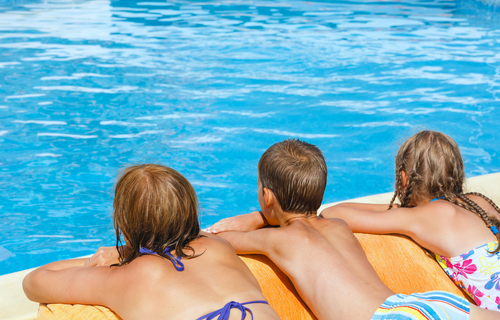 Pools, of course, need chlorine to kill algae and bacteria. Without it, the water would turn green, cloudy and would be unhealthy to swim in. That’s the last thing you want on a hot summer day when you’re wanting to take a refreshing dip!
Pools, of course, need chlorine to kill algae and bacteria. Without it, the water would turn green, cloudy and would be unhealthy to swim in. That’s the last thing you want on a hot summer day when you’re wanting to take a refreshing dip!
However, the same sunlight and heat that you enjoy while using your pool also affects the level of chlorine. The ultraviolet rays of the sun can reduce chlorine by up to 90 percent in two hours! And if it’s a hot day, warmer water tends to breed more bacteria, and so the pool’s chlorine gets used up faster and must be replenished more frequently. Then couple that with an increased bather load, the demand on chlorine will be even higher.
Rule of Thumb: For every 10-degree Fahrenheit (6 degree Celsius) rise in temperature above 80 degrees Fahrenheit (26 degrees Celsius), you should add as much as 50% more chlorine to your pool water to maintain appropriate levels of free chlorine.
So…..make sure you are adjusting your pool water to meet the demand. It can take more than a week for your pool to recover from an algae outbreak or sudden water cloudiness.
Test Water Frequently: When conditions that require more chlorine arise, you will be able to see your sanitizer disappearing when you test the water. You don’t have to be a certified technician or water chemist to be able to test and know the condition of your pool water.
Prevention is Always Easier: It is easier to simply maintain well-balanced pool water than to clean cloudy or green water. Consistent testing and monitoring ensures that your water stays clean and safe to use, whereas ignoring it can leave you without a pool until you figure out exactly what is going on.
You might also want to consider using stabalized chlorine. Stabilized chlorine contains cyanuric acid. Cyanuric acid (CYA) protects chlorine from the sun’s UV rays (think of it like chlorine sunblock).
If an outdoor pool is using chlorine and no cyanuric acid present is in the water, the sun will quickly break it down. This means you’ll constantly be feeding your pool chlorine to keep the pool water chemistry balanced.
So, cyanuric acid prolongs the life of chlorine – about 3 to 5 times longer than unstable chlorine. This is great for you because you won’t need to keep spending money on replacing sun-depleted chlorine!
In addition to maintaining the correct amount of chlorine in your pool, you may also want to consider adding a sunblock. Pro Balance UV Block is a great product to add to your pool water to slow down the chlorine from burning off. This will prolong the life of your chlorine and prevent it from burning off in the suns hot UV rays thereby saving you money and enusring a healthier swimminig experience!
To assist you in maintaining crystal clear water, we encourage you to bring in a sample of your pool water to our lab at Backyard Leisure and have the levels tested. Our water care experts will provide you with a computerized analysis and recommendations.
For answers to other pool water care questions, check out our Swimming Pool Water Care FAQ page.
